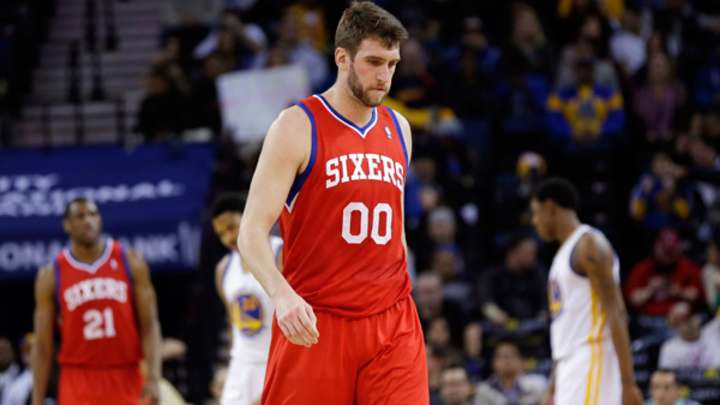Cavaliers resist blowing things up at deadline after six-game winning streak

Spencer Hawes is heading to Cleveland to join a confusing frontcourt logjam. (Marcio Jose Sanchez/AP)

It still isn’t known how David Griffin's tenure as Cavaliers general manager will play out (or how long he’ll be in Cleveland), but one thing seems certain in the short time he’s been on the job: It’ll be a vastly different stint from that of former GM Chris Grant.
The Cavs traded two second-round picks, forward Earl Clark and little-used center Henry Sims to Philadelphia for Spencer Hawes on Thursday. That was it, despite the lure and pull of a number of discussed and reported talks involving just about everyone on the roster ahead of the trade deadline.
This goes a long way toward closing the book on Grant’s last offseason with Cleveland, as the signings of Clark and Andrew Bynum (who was traded in the Luol Deng deal) are gone and many of Grant’s precious stockpiled picks have been dusted off and taken out of storage to use in the barter system. Cleveland didn’t exactly blow things up -- and why would it, given that Griffin has been with the team since 2010 and most assuredly had a say in drafting the likes of Tyler Zeller, Dion Waiters and Tristan Thompson -- but the deadline represented a slight shift in philosophy from the Grant era.
NBA Trade Deadline: News, updates, trades from Thursday
The mythical “make the playoffs” mandate often cited as the Cavs’ end-all, be-all goal for the 2013-14 season is still in play. What’s often lost in the marching orders is, Which type of playoff team do they want to be? Building a solid foundation to develop picks and surround a core with useful veterans is a great idea in theory, but it requires patience and hitting on picks, something that seemed lost in the tail end of the former general manager’s final days with the team. When the team traded for Deng on Jan. 7, it was 12-23. After a season-high six-game winning streak heading into the deadline, it's possible Griffin saw enough to keep the team together as assembled (aside from Sims and Clark, who were both not really in the rotation) and re-evaluate during the summer. Who knows what he would have done had the team gone into the deadline in an outright tailspin?
GOLLIVER: Trade deadline winners and losers
[si_video id="video_B32ADDD2-39C7-E2CF-A070-51BF794F3537" height="470"]
They say you can be the Thunder or you can be the Bucks (OK, no one says that), and under Grant -- especially after the 2013 draft -- the Cavs weren’t really sure what they wanted. Jumping up and down yelling about how they’ll never be in the draft lottery again was foolish. Signing guys like Bynum and Jarrett Jack seemed like quick-fix video game moves that weren’t made with the overall progress of the team in mind. And trading for Deng always reeked of desperation.
MAHONEY: Can Hawes help out the Cavaliers?
Griffin’s approach seemed to hedge both sides. He kept the young guys together, something that didn’t seem all that likely leading up to the deadline. Rumors about Zeller, Waiters and Thompson were a dime a dozen, but ultimately the return was never worth moving controllable assets who have been playing better of late. Yes, the Eastern Conference is a quagmire, but if the playoffs were a goal, it’s still an achievable one, with making the lottery somewhat of a consolation prize. Neither outcome is bad. Griffin seems to understand that.
It’s easy to discount the Hawes move, but if Anderson Varejao isn’t healthy for the third straight season after the deadline, the Cavs still need a center who can score. Hawes can do that, even if he’s the butt of a lot of jokes on Twitter. The Cavs didn’t really give up that much in the grand scheme of things, and that’s admitting there is tangible worth in second-round picks in today’s collective bargaining agreement.
Cleveland was active at the deadline, as Griffin said it would be, but active doesn’t mean making moves just to make them. That’s why the Jordan Hill deal with the Lakers, the Reggie Bullock-for-Zeller rumor with the Clippers, the Jack trade options and other possibilities didn’t end up happening. For all the craziness that could have ensued, a streaking team ended up getting a productive NBA player for a Metro card with an unknown amount of money left on it, two K-cups and some CVS ExtraBucks. 76ers GM Sam Hinkie might be able to red paperclip his way to something tangible down the road, but Griffin had no interest in doing that himself. At least not right now.
Had the Deng move never happened in the first place, this would’ve seemed like a solid trade in a vacuum. Hawes is a short-term rental who can spread the floor and who isn’t a redundancy with the rest of the Cavs' post players. It makes sense, especially if the team continues to play well. If Cleveland falls apart, Hawes is off the books at the end of the year and it has plenty of financial flexibility, of critical importance with the repeater tax set to kick in.
But Griffin will be judged somewhat by what his predecessor did (that’s how positions of power work), so the Cavs are still the team that signed Bynum and Jack and traded for Deng and now traded for Hawes, too, and really has nothing to show for it (yet).
Cavs have now given up 5 picks combined (four seconds, 1 possible 1st) for Deng and Hawes.
— Zach Lowe (@ZachLowe_NBA) February 20, 2014
That’s part of the challenge for Griffin as he (a) tries to clean up whatever mess was left by Grant and (b) tries to keep his job. What is the end game?
